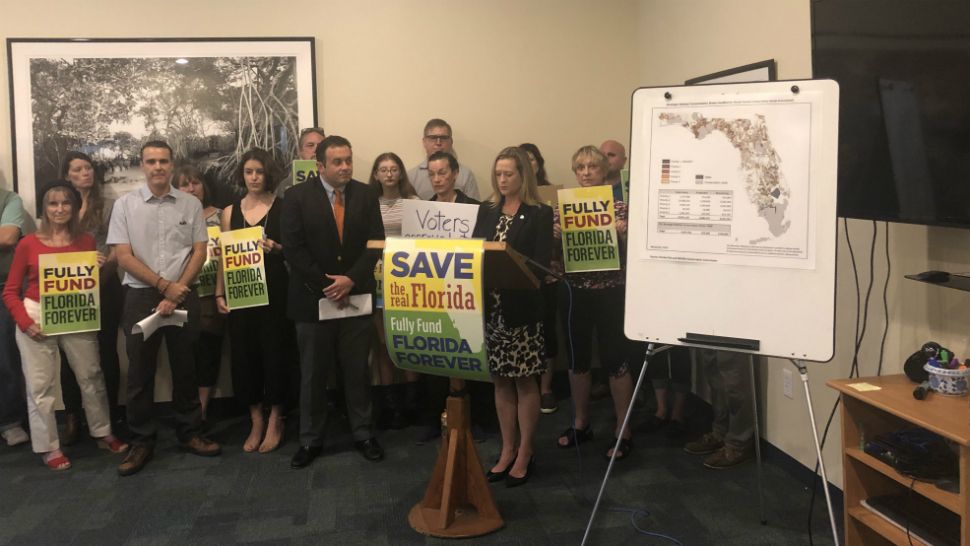Spectrum Bay News 9 Political Reporter Mitch Perry is looking for deeper meaning in politics and government so our local stories have more of a connection in your daily life.
ST. PETERSBURG, Fla. — Five years ago, Florida voters overwhelmingly approved a constitutional amendment that mandated that a specific amount of tax revenues be dedicated to purchasing and conserving state land and waterways.
It hasn't exactly worked out that way.
- 75% voters approved the 2014 Land & Water Conservation amendment
- Governors Bob Martinez, Jeb Bush previously signed land acquisition programs
- Environmental advocates calling for $400M of next year's budget to go to program
That’s why environmentalists in St. Petersburg on Friday called on Gov. Ron DeSantis and the state legislature to fully fund Florida Forever, the state’s main conservation land-buying program.
“We’ve had a rough decade in terms of conservation and true investments in our water, wild spaces, and wildlife. It’s been downright rotten, and it’s time for a change,” Lindsey Cross, the government relations director for Florida Conservation Voters, said.
The 2014 amendment called for 33 percent of tax collections from real-estate documentary stamps to the state’s Land Acquisition Trust Fund to protect the environment. The legislature has instead raided the Florida Fund Forever to cover other expenses, resulting in the state allocating only $33 million on conservation programs in last year’s state budget.
And while the governor has proposed increasing that amount to $100 million in next year’s fiscal budget, environmental advocates say that’s a woefully miniscule amount for a state budget that will come out to a more than $90 billion dollar budget, the largest in state history.
“It’s unacceptable that we’re doing so little, despite the fact that we’re losing 100,000 plus acres of natural agriculture lands to sprawl and development each year,” said Tim Martin, conservation chair of the Sierra Club of Florida. “That’s unacceptable when the state agrees to spend billions of dollars on new toll roads, but starves land acquisition funding to free up ranch lands in rural counties for further development once their built.”
According to state economists, the Land Acquisition Trust Fund is projected to receive $943 million from the documentary stamp tax in the 2020-2021 fiscal year. State law mandates that the Legislature must pay off its debt service on Florida Forever and Everglades Restoration bonds.
After that, nearly $200 million is devoted to the Everglades, with springs restoration getting at least $50 million.
What remains after that is $470.12 million. And that’s the amount that the environmentalists are calling on the state to spend in the upcoming fiscal year on land acquisition.
Historically, the state had devoted hundreds of millions of dollars annually on land conservation, under both Republican and Democratic party leadership.
In 1990, then Governor Bob Martinez proposed — and the legislature approved — a $3 billion land preservation fund based upon $300 million in yearly bonded fund over 10 years. In 1999, the Florida Forever program was signed into law by Governor Jeb Bush and the legislature.
But funding for the program dried up during the recession years, compelling environmental advocates to work towards putting the 2014 constitutional amendment on the ballot. Nearly 75 percent of voters approved the measure.
“The idea behind the constitutional amendment is that a third of the money from doc stamp revenue is supposed to go to land and water conservation efforts,” said St. Petersburg Democratic state Representative Ben Diamond.
“What the Legislature has been doing is taking some of that money and using it instead of funding these projects to fund, for instance, the back office operations of the Department of Environmental Protections.”
Two environmental groups, the Florida Wildlife Federation and the Florida Defenders of the Environment, filed a lawsuit in 2015 claiming that state lawmakers had improperly diverted portions of the funds to other expenses.
A Leon County judge ruled in favor of those groups in 2018, but the state has appealed the ruling.
“We have to hold leadership and the governor accountable, and we have to come together and make this happen,” Diamond says. “We have to reject this argument that because we’re funding water protection at a higher level, or because we’re funding this resilience effort, it’s just not going to work. We’ve got to find a way to address all in issues and to do it in a sustained way, year after year. We especially have to do it now when we have the revenue to do it.”
In addition to the event in St. Petersburg, similar press conferences were held around several other parts of the state on Friday.
The 2020 Florida legislative session begins on January 14.



